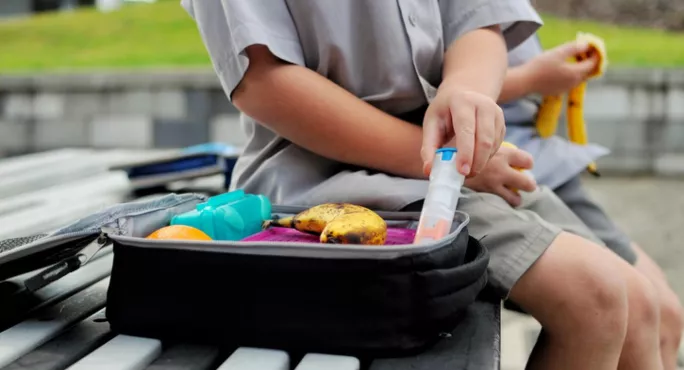How to support children with allergies

In the last 10 years, the number of hospital admissions for anaphylaxis has risen by 38 per cent. It’s extremely likely you will have a child in your school, and even in your class, with a severe allergy. And yet so many of us don’t know how to deal with it.
Indeed, until my son suffered from a serious allergic reaction to horsehair and then an anaphylactic reaction to food, I knew very little about allergies.
I knew that hayfever was an allergic reaction, but I didn’t realise that allergic reactions could result in death. I didn’t realise how scary it was to have allergies or to be a parent of a child with allergies. Parents in a similar position to me have spoken about how worried they are about sending their children off to school not knowing whether or not they’ll be safe, praying they make it through the day without an allergic reaction.
More:
There are some simple ways, however, that schools can elevate these fears, and reduce the anxiety parents feel. And it’s not just about the parents, children with allergies can have a really tough time at school, unable to eat the same food or do the same things as their peers. So what can leaders and teachers do?
1. Do the research
Having a child with allergies in your class or tutor group may seem a little daunting, or even frustrating at first, but it is possible to make a huge difference to their education through a few tweaks and some thought.
Be curious, if you don’t know about allergies, put some time aside to do some research. There is a great free course from the Anaphylaxis Campaign that takes about an hour to complete.
There are other resources available to support understanding for adults and children alike in the Anaphylaxis Campaign: Making Schools Safer Project 2021. You will find lesson resources, assemblies and fact sheets.
2. Being proactive
Proactively arrange a meeting to talk to the student and the parent about the student’s allergy and find out what worries them the most.
Are you going on a trip? Or using food in your lesson? Don’t wait for the parent to contact you - instead, arrange to talk to the student or parent in good time so that adaptations can be made if necessary. This inspires confidence in the parent and student, reduces anxiety and ultimately makes your life easier with fewer parental contacts to deal with.
3. Craft and cooking
Remember to plan ahead: will the craft materials be safe? For example, you shouldn’t use crunchy nut boxes with a peanut allergic child, or plastic milk bottles or yoghurt tubs with a milk allergic child. When cooking, check the recipes are inclusive, or that they can be adapted. Ask the parents what brands they use - they will be willing to help.
4. Food in lessons and celebrations
Is the food in the lesson essential if it is the child’s allergen? Imagine sitting in a room with your worst fear, feeling scared and unable to do or say anything. Imagine it was a person you trusted who had created that situation. Yet this is the reality that allergic children face in school when we don’t consider them in lesson planning and treats.
Parents and carers will usually provide a “safe treat box”, but it would be even better if everyone had the same and the box wasn’t needed. Usually, all it takes is a tweak.
5. Be a role model
The way we as teachers behave sets out the way that others treat children with allergies. Making conversation about allergies a standard part of your interactions normalises it; this is what children and young people want. They don’t want to be different.
6. Educate your pupils
The PSHE curriculum requires schools to teach first aid and health. By the end of primary school, children need to know the facts and science relating to allergies. And by the end of secondary, they should know life-saving skills, and this should include anaphylaxis and how to administer an auto-injector that contains life-saving adrenaline.
Tracey Dunn is the headteacher at Fitzmaurice Primary School and education ambassador at the Anaphylaxis campaign. She tweets @gerryakaTracey
You need a Tes subscription to read this article
Subscribe now to read this article and get other subscriber-only content:
- Unlimited access to all Tes magazine content
- Exclusive subscriber-only stories
- Award-winning email newsletters
Already a subscriber? Log in
You need a subscription to read this article
Subscribe now to read this article and get other subscriber-only content, including:
- Unlimited access to all Tes magazine content
- Exclusive subscriber-only stories
- Award-winning email newsletters
topics in this article



